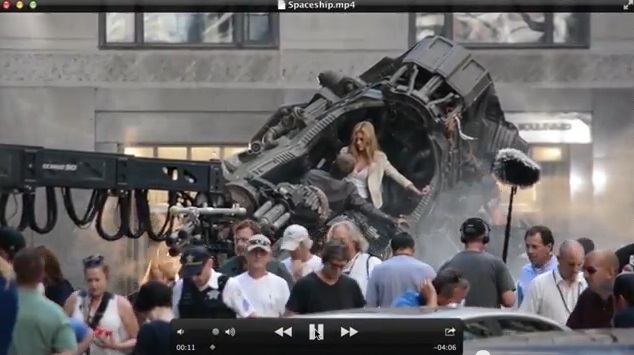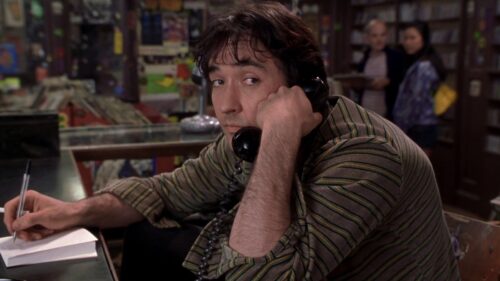At no point in cinema history has a movie been just a movie. But something special happened when the Internet gained the infrastructure and network bandwidth to support streaming video. In concert with the rise of social networking, this development allowed people to trumpet their movie love with much greater volume than that of a graphic tee or bedroom poster. Big media companies seized upon this cultural trend as a mass marketing opportunity. The major studios dispatched their promotional agents into budding social networks with the calculated solicitude of government infiltrators. A decade later, where are we? What do the big tentpole blockbuster films mean to us? And what are we to them?
Filmmaker-scholar-critic Kevin B. Lee—a friend as well as a colleague who’s published alongside me at many film sites, including this one—has made a breathtaking new video, “Transformers: The Premake,” and it is about where we are right now. He uses the upcoming mega-movie “Transformers: Age of Extinction” as a lens through which to view the present physical and economic reality as shaped by Internet reality as determined by the economic bottom line. It’s a love story. The lovebirds are we, the people, and the entertainment industry that so awkwardly courts us, like Shia LeBoeuf pawing at Megan Fox. But as a spectacle of personal yearnings exploited on a global scale, Lee’s video is more thrilling than the previous four “Transformer” films combined.
But what the hell is a premake?
In his notes for the video, Lee writes, “There have been fan remakes of movies for years – as kids, my friends and I would videotape ourselves acting out favorite movie scenes. The idea of ‘premaking’ a movie has now come into play because of the incredible access people now have to Hollywood’s pre-production and production activities… And they can go to locations and film their own footage with cameras as small as their palms, and then upload almost instantly.” He wondered, “what if one were to take all the footage that’s available and make a version of the film, and actually release that version before the actual film is released? We now live in an age where consumers are their own producers. How does this new power transform the dynamic between big media corporations and audiences whose traditional role is to passively consume entertainment?”
With these questions burning, Lee set out to create his “Transformers” premake using hundreds of filming location videos ripped from YouTube, official studio trailers and promotional materials along with his own gonzo footage from the movie’s Chicago shoots. But unlike Michael Bay‘s epic, the video’s genre is not sci-fi fantasy but Desktop Documentary. The entire film takes place on Lee’s MacBook Pro screen. “Desktop documentary is an emerging form of filmmaking,” Lee writes, “developed at the School of the Art Institute of Chicago by faculty artists such as Nick Briz, Jon Satrom and Jon Cates, and students such as myself, Yuan Zheng and Blair Bogin. This form of filmmaking treats the computer screen as both a camera lens and a canvas, tapping into its potential as an artistic medium.”
What makes “The Premake” such a dazzling desktop doc is the seamless way it appears to move through real time while mouse clicks, Google searches, stacked and resized video windows and overlapping found commentary from all corners of the globe provide a dense but always digestible view of Lee’s mind as it investigates and presents findings. It’s a choreographic feat reminiscent of shadow play or long-take master shots. Without voiceover narration, the barbed satire in Lee’s “voice” is all in the choice and timing of his juxtapositions, and a precise use of the desktop environment as frame. However scholarly its origins, this video is pure cinema.
While I am inclined to make a quick Kevin Lee > Michael Bay comparison here, Lee himself was not interested in creating a standard critique of the director’s work. Acknowledging that some critics even consider Bay a “bona fide auteur” (noting the Criterion edition of “Armageddon“) and that Bay’s film “Pain and Gain” “deals with similar subject matter as “The Wolf of Wall Street” in a more probing and disturbingly personal manner,” he says Bay’s “qualities as an artist, whatever they may be, aren’t of interest to me.”
“Instead I am trying to understand him as more of a trans-cultural industrial operator who performs a specific role in order to drive this monstrous production halfway across the world towards box office glory. I think seeing him in this context, rather than as a “movie director,” is part of attaining what I think is a more useful way of understanding what a franchise like ‘Transformers’ really amounts to. The conventional approaches of film criticism (“is the film good or not and why?”) don’t address what I think are the bigger issues of what this movie is doing in the world.”
In that sense, “The Premake” places the director of a tentpole blockbuster a lot closer to mere mortals in relation to the Autobot-sized clanking International movie machine. Our collective effort as employees and consumers keeps the machine running, but “The Premake” susses out how those two roles have become entangled online, and whose interests this blurring of lines serves or appears to serve.
It seems even film critics working the solidly commercial, social media-infused “content” grind are starting to pay less fractured attention to these slippery “bigger issues.”
“The Premake” has been in the making since September 2013, but “Art, Freedom and the Bechdel Test,” a recent Glenn Kenny essay on this website enters similar territory of blurred lines, dialectic relationships and hidden agendas. In one passage, Kenny asserts that pop culture traditionally serves up the illusion of personal empowerment, connectedness and even radical social change, but only as just another attractive item on the shelf: “Empathy is a great thing, but do we really gain it through pop culture? Or do we just posture and preen about our good intentions? Are we debating, to the point of rage, the color of the curtains, so to speak, while the same interests that have been running our lives forever continue to do so?”
Responding to Kenny’s article, Lee says, “There is a perpetual tension in how expressions of progressivism, radicalism or critical awareness can be readily co-opted and commoditized by mainstream culture. Of course when I say this I am thinking about “The Premake” and what fate lies ahead of it: whether whatever about it that can be called critical or even radical in its regard to global Hollywood will simply melt away, leaving an easily co-optable husk of Fun. I wouldn’t be surprised if soon studios will launch official “premake” contests where they encourage fans to make their own version of upcoming studio releases based on footage that fans are allowed to shoot on set. Crowdsourcing as outsourcing. Perhaps it’s the logical outcome of a society where everyone has the technology to make their own movies but still look to Hollywood for assigning which moving images are the ones worth caring about.”
That last comment reminds me of the finest line ever written for a “Transformers” movie: “We all work for the Decepticons now.” That’s my conclusion, but I also found the implications of “Transformers: The Premake” to be so vast, exhilarating, depressing and, yes, entertaining, that I can’t wait to learn what you see in this unprecedented work, through your own valuable eyes.












